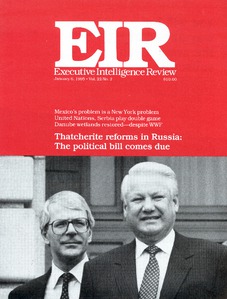Interviews
Gennady Sklyar
by Gabriele Liebig
A leader of the Socialist Party in Russia, Mr. Sklyar is active in the Obshchestvennaya Palata, a forum for political leaders, businessmen, and religious and cultural figures.
E.A. Opia
A delegate to Nigeria’s National Constitutional Conference from Delta State, Professor Opia taught American history in the California public schools for many years.
Departments
Andean Report
by Leonor Rubiano
Venezuela Holocaust Looms.
Editorial
What Is a Nation?
National Economy
Slovakians Restore Wetlands, Despite WWF Obstruction
by Alexander Hartmann
The government of Slovakia took on Prince Philip’s World Wide Fund for Nature in order to save the Danube’s inland delta and provide adequate power.
Saving the Danube’s Inland Delta
An analysis of the Gabcikovo-Nagymaros Project from Slovakia’s state-owned Water Management Construction company.
Economics
It’s Not a Mexico Problem, but a New York Problem
by Valerie Rush
The Mexican peso has been devalued by 40%, the productive economy is being wrecked, and the international bankers are moving in to demand that the U.S. government bail them out.
MSIA Calls for Debt Moratorium in Mexico
Venezuela’s Sinking Financial System Requires a Hamiltonian Overhaul
by David Ramonet
African Institute Debunks IMF Programs
by Bado Onimode
Currency Rates
Orange Co. Bankruptcy Puts Derivatives on National Agenda
by Nancy Spannaus
China: Foreign Speculators Have a ‘Screw Loose’
by Mary Burdman
Israel Could Link East and West, Says Ne’eman
by Marsha Freeman
In an interview with 21st Century Science & Technology, Israeli physicist Yuval Ne’eman gives a view of the Israeli space program’s work, and the raging battles over economic policy.
Business Briefs
Feature
Economic ‘Reforms’ Provoked Russia’s Chechnya Crisis
by Konstantin George
The real significance of the conflict in Chechnya lies not in the Caucasus, but in Moscow, where the failure of a quick military solution will have powerful ramifications against Boris Yeltsin.
‘We Should Take the Path of Developing and Implementing Major Joint Projects’
by Gabriele Liebig
An interview with Gennady Sklyar.
LaRouche’s Physical Economy Under Scrutiny
The economic policy debate in Russia divides between monetarist ideologues and those who want an industrialization program — Glazyev Calls for Industrialization Strategy — Arbatov: Shock Therapy Is Creating a Backlash.
Pigs Can Only Oink: Who Attacked Yeltsin, and Why
by Roman Bessonov
By our St. Petersburg correspondent.
International
Algerian Hijack: Look for British Geopolitical Hand
by Hussein Al-Nadeem and Dean Andromidas
By bringing the Algerian civil war directly into Europe, the “Entente Cordiale” crowd aims to divide Europe against potential American and German initiatives for peace through economic growth.
Sudan, Nigeria of Strategic Importance, Statesman Stresses
by Lyndon H. LaRouche, Jr.
Reporting on a visit to Sudan.
New Irish Government Backs Peace Process
by Mary Jane Freeman
UN, Serbia Play Double Game
by Faris Nanic
The personal delegate of President Alija Izetbegovic of Bosnia and Hercegovina addresses a conference of the International Caucus of Labor Committees and Schiller Institute in Germany.
German Court Reopens Investigation of 1987 Assassination of Uwe Barschel
by Rainer Apel
New evidence emerges that the former German state governor did not commit suicide. Will the trail to Oliver North’s Iran-Contra operation be uncovered?
Indian ‘Economic Reforms’ Get Ruling Party Routed at Polls
by Ramtanu Maitra and Susan Maitra
India Needs To Defeat the British Policy in Myanmar
by Ramtanu Maitra and Susan Maitra
We Are All Determined To Forge a United Nigeria
An interview with E. A. Opia.
International Intelligence
National
White House Incidents Show High-Level Threat to Clinton
by Edward Spannaus and Jeffrey Steinberg
Documentation: The record of British intelligence operative Ambrose Evans-Pritchard’s assault on President Clinton.
British Crown Hits Back at LaRouche in Canada
Bush Insurgents Aim Axe at Constitution
by Carl Osgood
The Project for the Republican Future has just about everything on its chopping block of proposed budget cuts.
Development Conferences: ‘No One Else Is Talking of Solutions’
by Marianna Wertz
The Schiller Institute is organizing conferences on economic development in cities around the country.
Congressional Closeup
by William Jones
National News
Corrections
Our report on “Prince Philip: ‘Doge’ of the Real Fourth Reich” (Dec. 16, 1994) contained an error on p. 71, concerning the family relations of Prince Bernhard of the Netherlands. His wife is Juliana; Beatrix is his daughter.
In Map 14 of “The Geography of World Economic Development” color map section (Jan. 1, 1995), the colors in the map legend were reversed. The light green lines indicate navigable rivers and waterways, while the blue lines indicate proposed new water routes.



